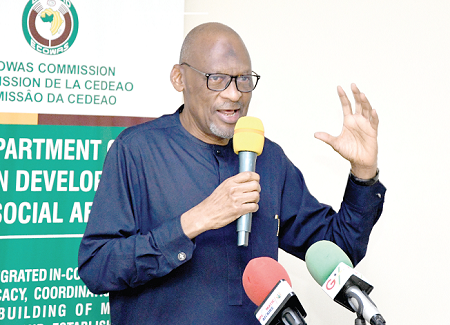
Stakeholders deliberate on enhancing human security, social protection
Stakeholders on human security and social protection have begun deliberations in Accra on the way forward in enhancing the protection of the vulnerable in society.
The three-day workshop, which commenced yesterday, is also aimed at building the capacity of participants on human security, considering the severe risks faced by the vulnerable and victimised populations across the ECOWAS region.
It is on the theme: “ECOWAS in-country high level advocacy, coordination and capacity-building meeting of multi-stakeholders” and participants will also discuss the establishment of the ECOWAS Protection and Human Security Integrated Coordination Mechanism (ECO-PHSICM) in the country.
Under the mechanism, responses to increased rate of violence, particularly against women and children, as a result of the COVID-19 pandemic will be highlighted.
The workshop is being jointly organised by the ECOWAS Commission, the Office of the ECOWAS Resident Representative and the ECOWAS National Office in Accra.
Significance
The Resident Representative of the ECOWAS Commission in Ghana, Baba Gana Wakil, described the meeting as timely, since, according to him, the COVID-19 pandemic and the Russia-Ukraine war had greatly affected the economies of member states.
He said the focus of discussions would be on the increased rate of violence against women, children and vulnerable groups.
"Children in our region still face a high prevalence of violence, including corporal punishment, high rates of child marriage and physical and sexual abuse.
"Regrettably, social norms and values, including a culture of silence, still pose a big challenge to the child protection system and services across our member states," he added.
He, therefore, called for increased social protection and access to basic services from governments of member states.
According to him, a decline in the wages and employment of migrant and semi-skilled workers triggered by the COVID-19 pandemic had also caused a significant reduction in remittances, thereby reducing the purchasing power of households.
Mr Wakil further called on countries to develop strong and enforceable legal, policy and institutional frameworks that were properly resourced and staffed to particularly address issues of women and children’s safety.
He also implored state and non-state actors to leverage the presence of the Office of the ECOWAS Resident Representative in the county to plan and implement their programmes.
Comprehensive approach
In a speech read on her behalf, the Minister of Foreign Affairs and Regional Integration, Shirley Ayorkor Botchway, called for a comprehensive approach to addressing the worsening cases of child abuse and trafficking in persons.
She, however, expressed hope that the establishment of the Office of the ECO-PHSICM in the country would aid in coordinating the efforts of all stakeholders to promote the rights and freedoms of people.
The Director of Humanitarian and Social Affairs of the ECOWAS Commission, Dr Sintiki Tarfa Ugbe, urged stakeholders to devise measures to improve human security and social protection in the region.
